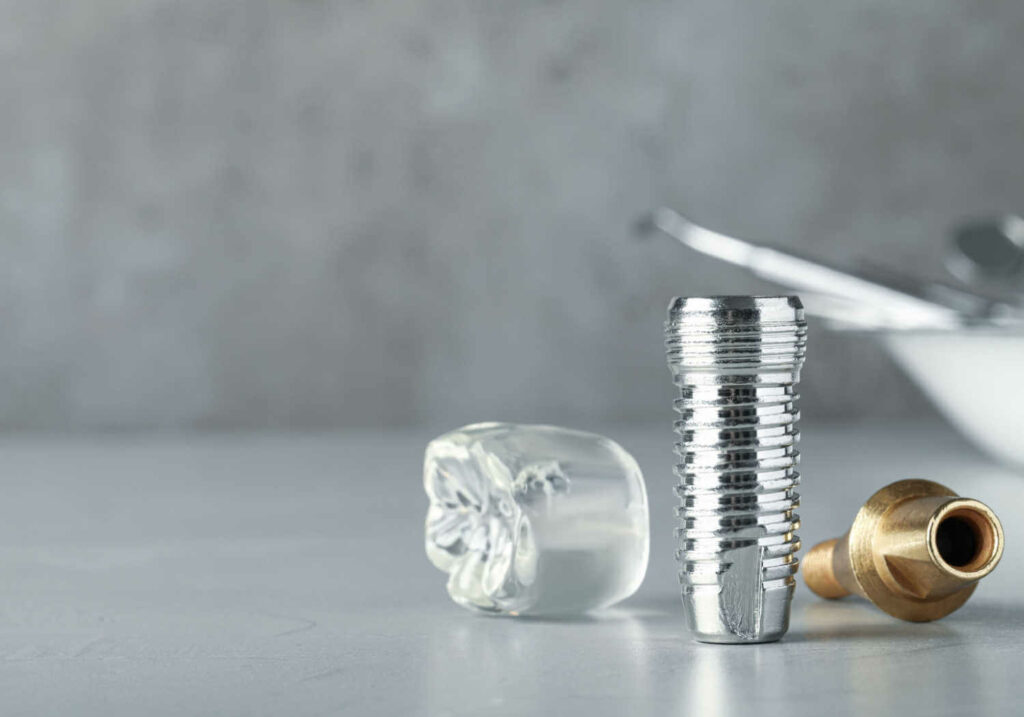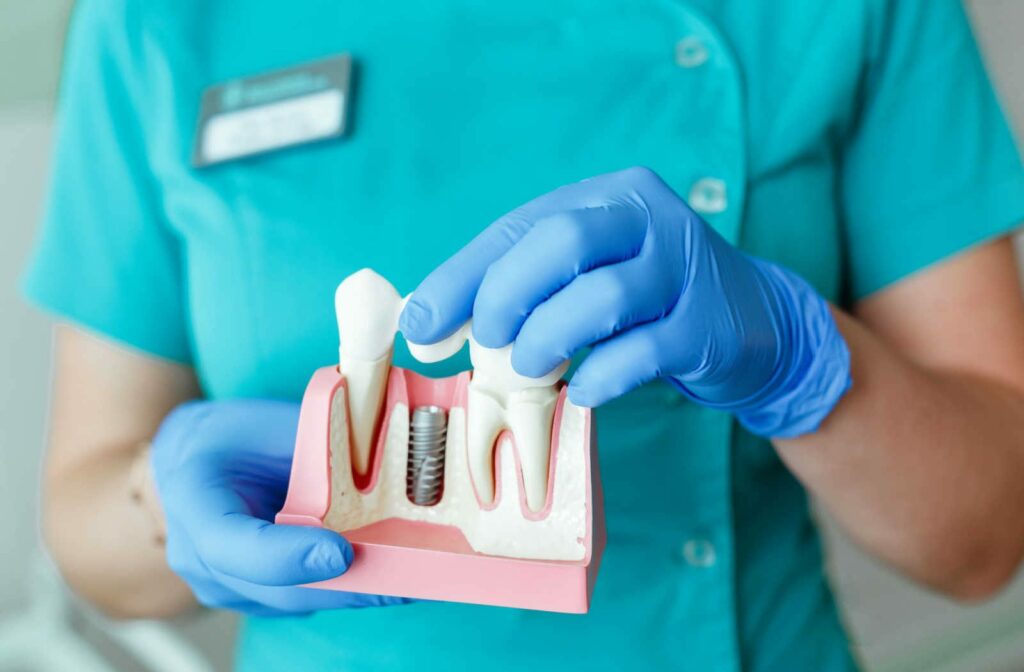Things happen, and our permanent teeth can be knocked out, or sometimes they have to be taken out. If you’re looking for a permanent solution, dental implants may be a great option, especially if you don’t want a bridge or dentures.
As with any procedure, dental implants have advantages and disadvantages. One major consideration is that dental implants don’t typically fall out but require maintenance to prevent failure. Weighing the pros and cons after an examination with your dentist is a great first step in deciding if implants are right for you.
What Is a Dental Implant?
Dental implant surgery may be the best option when a tooth’s roots are severely damaged. A dental implant replaces the tooth’s natural root with a metal post that’s embedded in the jaw bone. Once the bone has healed tightly around the new anchors, an artificial tooth is placed on the post to mimic your natural tooth’s look and function.
In many cases, dental implant surgery takes several months from start to finish due to the time needed for your jaw bone to heal, but your dentist can give you a more specific timeframe during your consultation. Generally the first step is that your dentist examines your mouth and takes X-rays to ensure your jaw and mouth are suitable candidates for the implants.
The following procedure (sometimes broken into 2) is the installation of the titanium posts in your jaw. Then the piece that connects the new tooth to the anchor is installed above the gums. Most times, the dentist waits until the jaw is healing before putting the abutment on, but it can be done in 1 procedure.
Finally, an artificial tooth is custom made to fit in your mouth. Sometimes this may take a couple sessions with your dentist to ensure the perfect fit.
Signs the Dental Implant Doesn’t Fit Properly
Dental implant surgery may take several sessions in order to ensure the artificial tooth fits perfectly so it lasts as long as possible. The following are signs that it doesn’t fit or is beginning to fail:
- Receding gum line or inflammation
- Difficulty when chewing
- Implant or tooth feeling loose
- Severe discomfort or pain
If you have dental implants and notice any of these signs, please contact your dentist immediately for an exam.
Dental Implant Advantages
Before discussing a few reasons that a dental implant could fail, it’s important to consider some of the great advantages of a dental implant versus a more traditional replacement option like dentures or bridges.
Advantages include:
- Uncomplicated eating: Because of their permanent nature, you have to be less careful with what or how you’re eating. They won’t get pulled out or move around in your mouth.
- Durable: Bridges or dentures aren’t a temporary solution by any means, but they don’t have the same durability that a dental implant has once it’s healed into bone.
- Improved aesthetics: Dental implants typically mimic the look and feel of natural teeth extremely well.
- Convenient: Dental implants don’t come out of your mouth. So, there’s nothing extra you need to do to take care of them. Simply continue your normal oral health routine of brushing and flossing every day.
Reasons for a Dental Implant Failure
A dental implant is typically a lifetime fix for a missing tooth. But even things that aren’t supposed to wear out or fall out can. For simplicity’s sake, we’ll break the possible reasons for dental implant failure into 3 categories: overall risk factors, early failure, and late failure.
Before the surgery is even booked, your dentist will review all the risk factors and ensure you understand. Some of them may not even apply to your situation, so your dentist is the best one to explain them to you.

Overall Risk Factors
These risk factors can play into the success of your dental implants at any point:
- Gum disease: Healthy gums are critical for the procedure’s success, so before your implant surgery, your dentist will check your gum health. Even after the surgery, an untreated infection in the gums or jaw could lead to the dental implant failing.
- Smoking: After the titanium post is put in your jaw, the bone must heal around it. If you’re a smoker, the healing process will likely be much slower because smoking restricts the blood flow to your jaw. Smoking can increase the risk of failure by up to 140%.
- Poor dental hygiene: Taking care of your mouth is essential for preventing complications with your dental implants. Your dentist will likely weigh your ability to care for your mouth properly when determining whether you’re a candidate for the surgery.
- Inadequate jaw bone: Because the posts are anchored in your jaw, the implant may be compromised from the beginning if you don’t have enough bone to provide structural support. This is another thing that your dentist will likely check before continuing with the surgery.
Early Failure
Possible reasons for early failure include:
- Infection where the titanium post is inserted or on the gum is always a possibility that could cause the implant to fail within the first couple of months.
- Micro-movement in your jaw bone could cause the implant to not settle in and properly bond with the bone.
- An allergic reaction to the metal used in the implant could cause complications relatively quickly after the procedure.
- Not following the post-surgery instructions, such as eating soft foods or not smoking, that your dentist gives can lead to complications.
Late Failure
Possible reasons for late failure include:
- Months or even years after the implant surgery, it’s possible that your body could reject the implant and cause problems.
- Injury to the implant area at any time can damage the implant and cause it to become loose, which could lead it to fail completely.
What Do You Do If the Dental Implant Falls Out?
If you’re missing multiple teeth and don’t want a denture or bridge, discussing dental implant surgery with your dentist is a great option. Not all dental clinics offer this service, so you may have to do some searching for a local dentist who does.
If you’re in Toronto, the team at Arch Dental is happy to offer this procedure. Give us a call today, and our helpful staff can answer your questions or schedule a consultation with one of our dentists.


